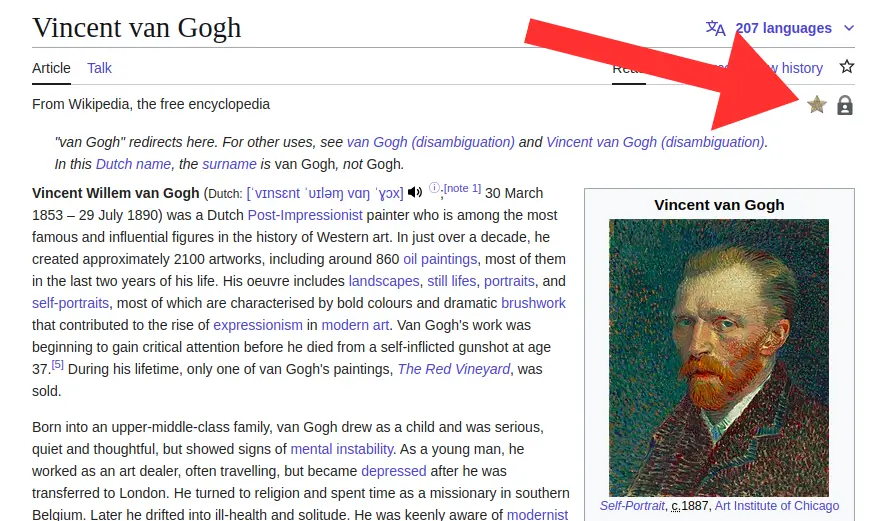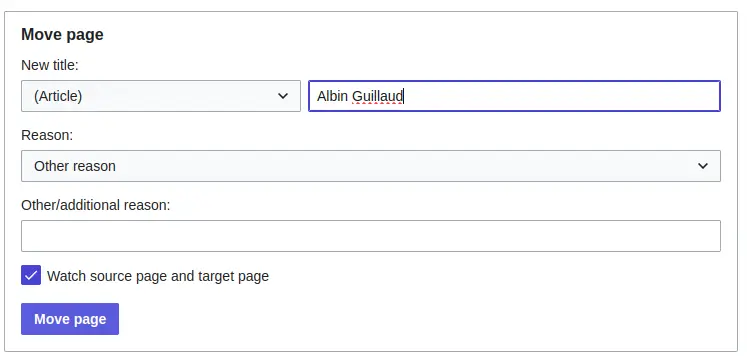It’s very common for artists (musicians, writers, painters, bands, photographers, architects, videographers/YouTubers, etc.) to want to create their own Wikipedia page. Whether it’s the artist themselves, their agent, or a close friend, there are specific considerations to keep in mind, which are outlined here!
Plan
- 1 Check that the Artist’s Notability is Sufficient for a Dedicated Wikipedia Page
- 2 Identify a Featured Wikipedia Article on an Artist for Inspiration
- 3 Create a Draft of the Page
- 4 Consider Submitting Your Article for Review
- 5 Declare Any Potential Conflict of Interest
- 6 Activate the Watchlist for the Page
Check that the Artist’s Notability is Sufficient for a Dedicated Wikipedia Page
This is a step that is often overlooked or rushed: verifying that the artist’s notability is sufficient in Wikipedia’s eyes to justify their own page.
🚨 If you don’t do this, here are the risks you may face:
- Wasting time creating a page that will subsequently be deleted.
- Making it more difficult to create a future Wikipedia page for the artist once their notability is sufficient.
- Having your account or IP address blocked on Wikipedia.
Are you convinced that doing this is relevant for both you and the artist? Here’s how to proceed in two steps:
- Identify the specific notability criteria for this type of artist. For example, there are specific criteria for painters, writers, etc. Consult the list of specific criteria.
- Through internet research, check if your artist meets these criteria. It will often be necessary to identify external media (not their own website) that mention this artist. Look for general media (not art magazines) and national coverage (not local press).
Also, consider checking Benezit, the dictionary of artists. If your artist is listed there, bingo! That’s a sufficient criterion to create a page 🥳!
See also: How Famous Do You Have to Be to Get a Wikipedia Page?
👀Check your eligibility on Wikipedia with a notability audit
Request a comprehensive audit from us to determine your eligibility on the encyclopedia (delivered within 48 hours) or learn about alternative options that may be more relevant for your situation.
Identify a Featured Wikipedia Article on an Artist for Inspiration
If you’ve never created a page on Wikipedia, starting from scratch can be challenging. Even after years of experience with the encyclopedia, I still occasionally find this difficulty!
To overcome this hurdle, a good approach is to draw inspiration from pages that Wikipedia labelled as featured articles. In particular, examine pages dedicated to similar artists. This will allow you to:
- Avoid writer’s block.
- Minimize the risk of the page not being published or being deleted because it does not meet Wikipedia’s standards.
Here is the list of featured articles on Wikipedia.

Create a Draft of the Page
Now that you have an idea of how to structure the page and what information to include, you can begin creating the page itself!
Here are the main steps to follow:
- Go to your draft after creating or logging into your account.
- Insert an appropriate infobox and complete it, including a copyright-free photo if possible.
- Create different sections and format them: Background, Activities, Publications, References, External Links, etc.
- Add one or more portals and categories.
- Write an introduction of one to a few sentences summarizing the entire article.
- Write paragraphs for each section, ensuring you select verifiable information that is encyclopedic in nature.
- Add sources for each piece of information, using a citation template to format the page correctly.
- Include an external link to the artist’s website (or, if unavailable, to the gallery representing them, the publishing house for a writer, etc.).
- Conduct a thorough proofreading to avoid superlatives and a tone that may sound too promotional.
✍️ Delegate the creation of your Wikipedia page
Leverage our 12+ years of experience with the encyclopedia to save time and maximize your chances of success.
Consider Submitting Your Article for Review
Once your article is finalized in draft form, you have two options:
- You can request a preliminary review. This is recommended if you are not accustomed to contributing to Wikipedia.
- You can move your draft to the article space. The article will be live immediately, but both robots and humans will review it to ensure it belongs in the encyclopedia.

Declare Any Potential Conflict of Interest
Wikipedia allows contributions from individuals who have a direct connection to the subject of the page they are creating or editing: a CEO creating a page for their company, an artist creating a page about themselves or their band, a parliamentary assistant modifying their MP’s page, a marketing manager editing their employer’s page, etc.
However, these contributions are monitored. You must declare your conflict of interest on the talk page of the articles you edit, on your Wikipedia profile, and/or in your edit summary.
🚨 If you don’t do this, you expose yourself to the following risks:
- The addition of an unsightly red banner at the top of the page saying “undisclosed paid contribution.”
- Deletion of the page.
- Blocking of your account and IP address.
🤓Train your team to manage Wikipedia the right way
Hands-on workshops designed for communication, PR & marketing teams.
Delivered live online – build lasting in-house expertise.
Activate the Watchlist for the Page
Once the page is live, others may modify it (or even delete it). To keep track of this, I recommend activating the watchlist for the page.
Click on the star at the top of the article and choose a watch period (1 week, 1 month, etc.). You will then be notified by email of any changes (even for a simple typo)!
I hope this guide has been helpful to you. You will find additional resources on my website to support you in your writing project independently. If you would like to use my services, feel free to contact me. Looking forward to it!

Written by Albin Guillaud
A Wikipedia contributor since 2014, with Wikiconsult I support businesses, institutions, public figures, and agencies looking to create, update, or monitor their presence on Wikipedia.